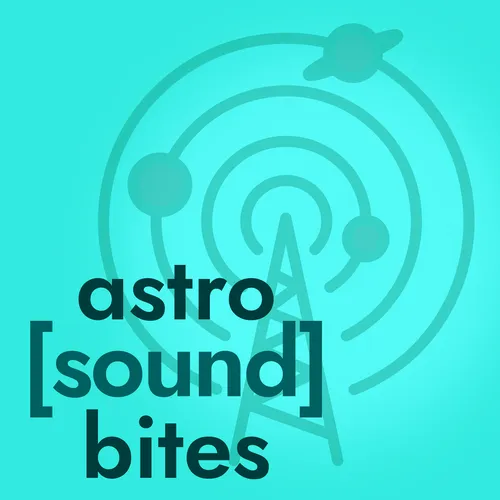![astro[sound]bites - Podcast](https://b2.eachpod.com/podcast-imgs/469bea6f5b8050598de4830685fd6027.webp)
astro[sound]bites
Astrobites for your ears. Three grad students bring you cutting-edge research findings in astronomy and connect the dots between diverse subfields.
- Update frequency
- every 13 days
- Average duration
- 46 minutes
- Episodes
- 121
- Years Active
- 2019 - 2025

Episode 93: Itsy Bitsy Teeny Weeny Primordial Black Hole Machiney
In this week’s episode, we take a look at the hottest trend in dark matter candidates - Primordial Black Holes. They’re like black holes, only smaller (in some cases)! Join us as we see what all the …

Episode 92.5: The Ship of 3-seus
We've reached a pivotal moment for astro[sound]bites: the podcast era where each of the original co-hosts has been replaced. Just like the Ship of Theseus, we ask: Is astro[sound]bites still the same…

Beyond- Astronomy is a little Mental
Episode 92: Beyond- Astronomy is a little Mental
Astronomy is hard! And in ways that extend far beyond the science we do every day. In this Beyond episode, Kiersten and Cormac talk all about mental…

Episode 91: A Uranian FareWill
91 is the atomic number of protactinium. Speaking of protracted, it’s finally time to say FareWill to Dr astroSaundbites himself, after five years of co-hosting our wonderful podcast. We begin with a…

Episode 90: The Great H0 Debate
How fast is the universe expanding? It turns out this important value, the Hubble constant (H0), is under constant debate. The two main teams have numbers that disagree by over 5 standard deviations!…

Episode 89: Extremely Emotional Exoplanets
In this episode, we hear about Kiersten and Will’s epic adventures in both hemispheres! Both Kiersten and Will watched the eclipse that passed through North America on April 8, 2024 and are still buz…

Episode 88: The Luck of the Irish
In celebration of the a-bit-over-a-week after St. Patrick’s (definitely not Patty’s) Day, we bring you another Ireland-related episode. Due to historically unsupported stereotypes about the Irish bei…

Episode 87.5: The Shamrock Shake-Up
In celebration of St. Patrick’s (not Patty’s) Day, we share a super short sneak peek at next week’s episode, featuring fun Irish astronomical facts. We’re calling it the Shamrock Shake-up! In additio…

Episode 87: Unexpected Gravitational Waves
We talk about gravitational waves again, but this time, in ways you wouldn’t expect. Cormac tells us how you could use gravitational waves to study the interior of the Sun, if the alignment is just r…

Episode 86: Indigenous Astronomy Part II - Science of the First Astronomers
In the second episode of the astro[sound]bites series focusing on Indigenous astronomy, we interview Duane Hamacher, a physics professor at the University of Melbourne and a world leading researcher …

Episode 85: Indigenous Astronomy Part I - Living Descendants of the First Astronomers
Did you know that Indigenous communities around the world have been doing astronomy since ancient times? Indigenous peoples studied the night sky with great precision. In this episode, we talk to fiv…

Episode 84.5: Come Podcast With Us!
Did we mention we’re recruiting two new co-hosts? And also our new Mars Office Manager and Chief Astrologer? Lots of exciting things are happening on a[s]b (and on Mars) in 2024 and we want you to be…

Episode 84: Abominable Ice
It’s all about ice, ice, baby! In this episode, Sabrina takes us on a trek to Antarctica. While we hide from Cthulhu, she tells us how the frigid observatory IceCube is using elusive neutrinos to tel…

Episode 83: Stellar Shrinkflation
In this week’s episode, Cormac has somehow made it to hosting a second time (applause). This time, we discuss the smallest, reddest and exoplanetiest(?) stars - M dwarfs! Find out why we call them th…

Episode 82: So the universe thinks it can dance?
This week, our astro[sound]bites co-host crew starts a dance crew with the help of Kiersten, a former professional ballerina. We get a sample of Kiersten’s ballet skills through her astrobite, which …

Episode 81: Hubble’s Hydra
In this week’s episode, Cormac makes his hosting debut as we talk about the most pressing threat to modern Astronomy (other than a worldwide coffee shortage) – megaconstellations! Despite sharing a m…

Episode 80: The Pulsar Boomerang
In this week’s episode, we meet some of the animals in the neutron star zoo through astrobites with two surprising observations. Will tells us about a mysterious signal from a magnetar that appeared …

Episode 79: The Vanishing Act
Spooky season is here! In this episode, we’re investigating the ghostly disappearances of astrophysical objects. Sabrina does some detective work to solve the mystery of a missing black hole, and Kie…

Episode 78: There’s More Air out There
We went on summer break (or winter break for our astronomer down under) but JWST did not! In our first episode back, we report on two new JWST Astrobites about exoplanet atmosphere. Kiersten tells us…
![Episode 77.5: Astro[sound]bites on three continents](https://b2.eachpod.com/podcast-imgs/469bea6f5b8050598de4830685fd6027.webp)
Episode 77.5: Astro[sound]bites on three continents
In this episode, astro[sound]bites gets even more international as we welcome our new co-host, Cormac Larkin, based in Europe! We sit down in three different time zones and continents to learn more a…